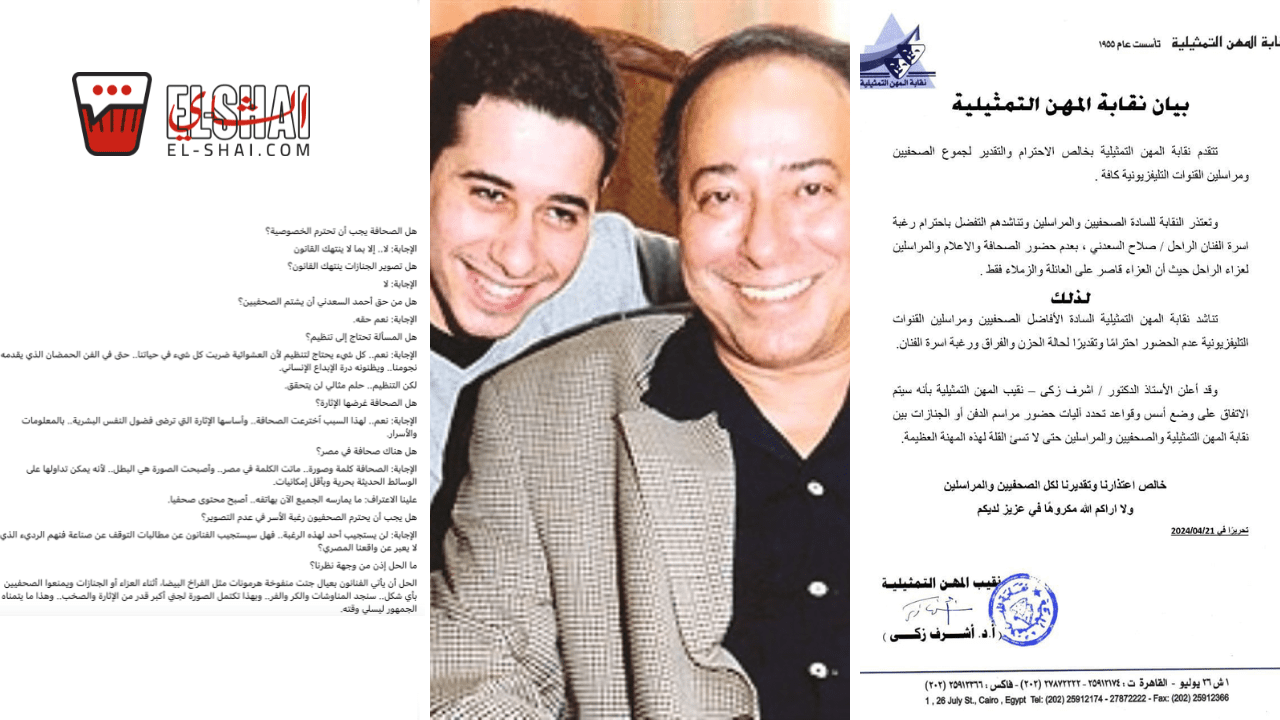The passing of Egyptian actor Salah El Saadany triggered a debate about ethics in journalism, especially surrounding privacy during funerals. El Saadany’s family requested that journalists not attend his funeral or take photos, which some journalists objected to, citing press freedom. This response led to public criticism and discussions about the ethical boundaries of journalism.
Legislative Context for Funeral Privacy
Recent legislative changes in Egypt have sought to protect funeral privacy. An addition to Article 88 of the Penal Code prohibits publishing or broadcasting images or videos of funerals without prior written consent from the deceased’s family.
This law aims to respect personal privacy during sensitive times. An Egyptian Representative noted that this amendment doesn’t ban reporting on funerals, only photography and broadcasting without permission, reflecting the need to respect private moments.
Some Journalists’ Reaction
Note: For legal reasons, we are not including specific quotes or embedding posts from journalists in this article. This approach respects the privacy and legal boundaries involved while still addressing the broader ethical issues.
Despite this clear legal framework, some journalists expressed outrage over the family’s request for privacy. Their reaction revealed a concerning lack of empathy, as they seemed to prioritize their own interests over the family’s wishes.
Several journalists shared nostalgia for the “good old days” when artists would actively invite them to events, contrasting it with today’s environment, where journalists often face restrictions at high-profile events like funerals.
One journalist lamented the decline of the press’s status, suggesting that journalists used to have more respect and access, even recounting instances from the 1990s where artists would beg them to attend events. This perspective seems to overlook the emotional toll and personal nature of funerals, prioritizing journalistic access over family wishes.
Uncalled-for Criticism of Ahmed El Saadany
A group of journalists suggested boycotting Ahmed El Saadany, the late actor’s son, because of his interactions with photographers during the funeral. This approach seems extreme, given the sensitive context. To call for a boycott due to a person’s grief-driven response indicates a disregard for the emotional realities of losing a loved one.
The Ethical Question
Journalism, at its best, seeks to inform and respect the boundaries of privacy. The pushback against the family’s request and the subsequent call to boycott Ahmed El Saadany raises ethical questions.
Should the desire for a story supersede a family’s right to grieve in private?
These reactions suggest a broader problem with journalistic boundaries and the importance of respecting individuals’ wishes during highly emotional moments.
The case surrounding Salah El Saadany’s funeral points to the need for a more empathetic approach to journalism. While journalists play a critical role in informing the public, they must also consider the emotional and ethical implications of their actions.
The family’s request for privacy during the funeral was a reasonable one, reflecting their right to grieve without intrusion. Journalists who react with anger or threats of boycott fail to understand the human side of these events, emphasizing the importance of respecting personal boundaries in the pursuit of a story.
Let us end it by saying, that it’s very ironic that many published pictures from the burial while reporting on the news of the ban of media in the funeral. That ain’t it, guys.








What do you think?
It is nice to know your opinion. Leave a comment.